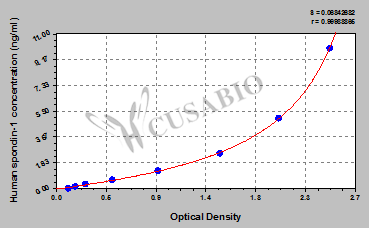This human spondin-1 (SPON1) ELISA kit employs the quantitative sandwich enzyme immunoassay technique to measure the levels of human SPON1 in multiple samples, including serum, plasma, or tissue homogenates. It also uses the enzyme-substrate chromogenic reaction to visualize and analyze the analyte levels through the color intensity. The intensity of the colored product is in direct proportion to the SPON1 levels in the sample and is measured at 450 nm through a microplate reader.
SPON1 is an extracellular matrix protein that is derived from the floor plate of vertebrate embryos and is involved in the growth of axons during embryonic development, differentiation of neural cells, and the promotion of axonal regeneration post-injury. SPON1 could bind the amyloid precursor protein and inhibit its cleavage by β-secretase, leading to cognitive decline in Alzheimer's disease. Aberrant expression of SPON1 has been found in solid tumors. SPON1 has been reported to promote tumor invasion and metastasis in liver cancer.






